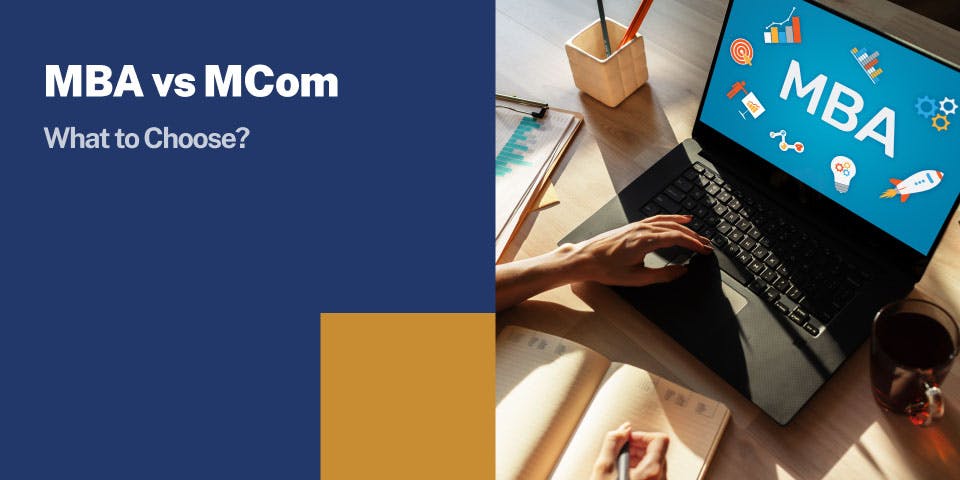5800 students unlocked their dream jobs with UG/PG programs in top colleges. Apply Now!
The world of higher education offers two main choices after earning your Bachelor of Commerce (B.Com) degree: pursuing an MBA degree or going into the specialised field of MCom. Many B.Com graduates are faced with the "MCom vs MBA" decision since both paths have benefits and opportunities that are different.
In this blog, we will compare both courses and help you answer which is best MCom or MBA?
MBA Course Highlights
|
Course Name |
MBA |
|
MBA Full Form |
Master of Business Administration |
|
Course Level |
Post Graduation |
|
Course Duration |
2 Years |
|
Types of MBA |
|
|
MBA Course Fee |
₹2 Lakhs - ₹27 lakh and above |
|
MBA Admission Process |
Entrance Exam ↓ Group Discussion ↓ Personal Interview |
|
|
|
Top MBA Specialisations |
|
|
Average MBA Salary |
₹5 - ₹25 LPA |
|
Top MBA Companies |
|
Why Choose an MBA Degree?
Here are the pros and cons of choosing to pursue an MBA degree after completing your Bachelor's in BCom:
Pros of pursuing MBA after B.Com
- Versatility: One of the significant advantages of an MBA is its versatility. This versatility provides students with a wide range of skills and knowledge that can be applied to various industries and roles.
- Leadership Development: MBA programs often focus on leadership and management skills. Students will learn how to lead teams, make strategic decisions, and manage complex business challenges, which can be invaluable for career growth.
- Networking Opportunities: MBA programs attract a diverse group of students with different backgrounds and experiences. This provides extensive networking opportunities that will be important in building professional connections and opening doors to job opportunities or entrepreneurial ventures.
- Career Advancement: MBA graduates often experience accelerated career progression. They are frequently considered for leadership roles and have the potential to earn higher salaries compared to those with only a bachelor's degree.
- Global Perspective: Many MBA programs have an international focus, exposing you to global business practices and trends. This can be particularly valuable in today's interconnected world.
Cons of pursuing MBA after B.Com
- Higher Cost: MBA programs are often more expensive than other master's degrees, including MCom. Tuition fees, living expenses, and the opportunity cost of not working during the program can add up.
- Time Commitment: MBA programs typically require a significant time commitment, often lasting two years or more. This can delay your entry into the workforce compared to shorter master's programs.
- Competitive Admissions: MBA programs are highly competitive, and admission can be challenging, with rigorous selection criteria, including work experience and standardised test scores.
- Intensive Workload: MBA programs can be demanding, with a heavy workload, group projects, and a fast-paced learning environment. Balancing work and study can be challenging.
- Narrow Specialisation: While MBA programs offer a broad foundation, they may not provide the depth of specialisation that some careers require. If you have a specific career path in mind, a more specialised degree might be more appropriate.
MCom Course Highlights
|
Course Name |
M.Com |
|
Course Full Name |
Master of Commerce |
|
Course Level |
Post Graduation |
|
Course Duration |
2 Years |
|
Eligibility |
Minimum 50 per cent marks in BCom, BCom (Honours), or equivalent from a recognised university. |
|
M.Com Course Fee |
₹50K - ₹60 K |
|
M.Com Admission Process |
|
|
Top M.Com Entrance Exams |
|
|
Top M.Com Specialisations |
|
|
Job Profiles |
|
|
Average Salary |
₹4 LPA |
|
Top M.Com Recruiters |
|
Why Choose an MCom Degree?
Here are the pros and cons of choosing to pursue an M.Com degree after completing your Bachelor's in BCom:
Pros of pursuing M.Com after B.Com
- Specialised Knowledge: M.Com programs provide a deep and specialised focus on commerce-related subjects such as accounting, finance, taxation, and economics. If you have a strong interest in these areas, an M.Com can enhance your expertise.
- Academic Pursuits: M.Com degrees can be a stepping stone for those interested in pursuing further academic or research careers, including the possibility of a Ph.D. This can lead to teaching and research positions in universities or research institutions.
- Cost-Effective: M.Com programs are often more cost-effective compared to MBA programs. Tuition fees and living expenses tend to be lower.
- Government Jobs: In some regions, government job opportunities in finance, commerce, and related sectors may require or prefer candidates with M.Com degrees. If you are considering a career in the public sector, an M.Com can be advantageous.
- Shorter Duration: M.Com programs are typically shorter in duration compared to MBA programs, allowing you to enter the workforce sooner and with a specialised skill set.
Cons of pursuing M.Com after B.Com
- Narrow Specialisation: While M.Com programs offer specialisation in commerce-related subjects, they may lack the broader business focus that an MBA provides. This could limit your career options if you decide to explore roles outside of finance and accounting.
- Limited Leadership Training: M.Com programs may not emphasise leadership and management skills to the same extent as MBA programs. If you aspire to leadership roles, you might need to acquire these skills through other means.
- Networking Opportunities: While M.Com programs can offer networking opportunities within your specific field, they might not provide the same level of diverse networking as MBA programs, which attract students from various backgrounds.
- Global Perspective: M.Com programs may not have the same international focus as MBA programs, potentially limiting your exposure to global business practices and trends.
- Career Opportunities Outside Finance and Accounting: If you have an interest in other aspects of business, such as marketing, operations, or strategy, an M.Com might not be the best choice as it is heavily focused on finance and commerce.
MBA vs MCom: Which is better?
It's important to know that whichever course is better than the other depends on individual career goals, interests, and circumstances. Both degrees have their own unique advantages, and what might be "better" for one person may not necessarily be the same for another.
It's advisable to conduct thorough research, speak with academic advisors, and consider your long-term career goals before making a choice. Both degrees can lead to successful and fulfilling careers, but the path you choose should reflect your unique circumstances and objectives.
Conclusion
So, as you stand at the crossroads of this pivotal decision, remember to reflect on your long-term vision. What do you hope to achieve? What challenges are you eager to conquer? And where do your passions truly lie?
Ultimately, the MBA degree is a testament to ambition, adaptability, and the pursuit of excellence. It's a journey that transforms individuals into leaders, visionaries, and change-makers in the world of business. But the choice is yours to make—a choice that will shape not only your career but also your future.
Sunstone will help you to build your skills with diverse course options at a campus that provides Sunstone's perks. We work to create your professional portfolio that will 200% increase the chances of your placement with our 200% placement assistance
FAQs: MBA vs MCom
Is an MCom better than an MBA?
Neither MCom nor MBA is universally better; the choice depends on your career goals and preferences.
What is the eligibility for MBA?
Any candidate with a bachelor’s degree from a recognised university is eligible to pursue an MBA program. You need to have at least 50% marks in your bachelor's, and having work experience would be the cherry on the cake. Every MBA business school is different, and so are their admission criteria. Some ask for MBA entrance exams, and some might give you direct admission.
Can I get MBA after the 12th?
You need to first pursue undergraduate courses in any discipline from a recognised university, and then you can pursue an MBA program.
HELP
Take the first step towards your dream job.
ABOUT THE AUTHOR

